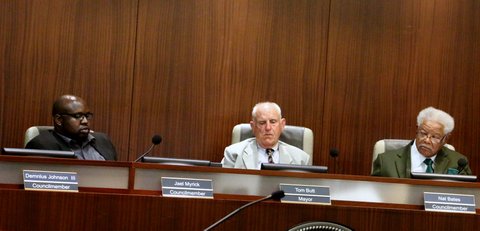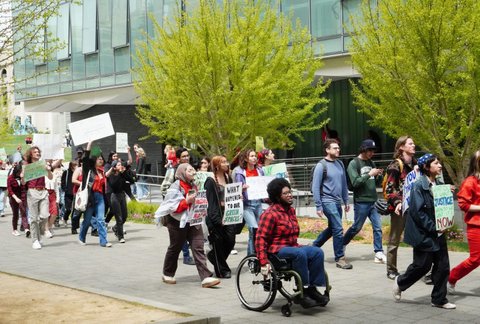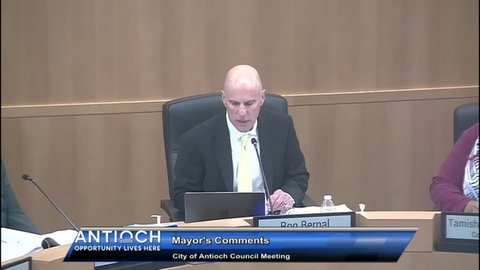
23 Oct District-Based City Council Elections Coming To Richmond

By Edward Booth
The City of Richmond is going to switch from a city-wide voting system to district-based voting when electing city councilmembers.
The change was approved Tuesday by a majority vote of the city council.
The switch comes as the result of a Sept. 11 demand letter sent to the city by Walnut Creek attorney Scott Rafferty. Rafferty alleged the city’s at-large election system — where council members are selected by popular vote — is racially biased. In his letter Rafferty claimed the at-large system dilutes the vote of Latino residents and violates the California Voting Rights Act of 2001. That law reduced the threshold of proof needed for minority groups to assert at-large election systems weaken their voting power.
Richmond will now begin the process of splitting the city into separate voting regions with one councilmember representing each area.
If the city had decided not to switch, a lawsuit from Rafferty or another attorney would likely have been initiated. Defending against CVRA lawsuits can cost millions of dollars, and no public agency has so far managed to win a lawsuit and avoid a switch.
The West Contra Costa School district — currently facing a roughly $48 million deficit — settled a lawsuit with Rafferty earlier this year, paying him roughly $318,000 in attorney’s fees.
The next step for Richmond is to adopt an ordinance and hold five public hearings in the next 90 days, all of them falling before January 20, 2020. City staff estimates the cost of a demographer to assist in the process, to be hired from National Demographics Corporation, will be less than $40,000.
A presentation on the CVRA and the city’s possible responses was given by attorney Michael Colantuono. He recommended that the city begin the process of switching so as to not be vulnerable to a lawsuit. He estimated a lawsuit could cost the city at least half-a-million dollars.
Councilmember Eduardo Martinez said it sounded like the council’s decision was only how much they wanted to pay for district elections, which Colantuno affirmed.
The council expressed mixed feelings on district elections as a concept, but all who spoke disagreed with Rafferty’s way of forcing the switch.
Councilmember Jael Myrick said he was broadly supportive of district elections, but he didn’t support Rafferty’s approach. Myrick said he thought district elections would lower the influence of special interests because campaigning in one district area would cost much less than across the entire city.
Myrick also said the racial diversity of the council — which currently seats three African American members, two Latino members, one Asian American member and a white mayor, and no women — could actually end up being hurt by districts.
“If the purpose of district elections is diversity, this is not the way to do it in Richmond,” Myrick said.
Councilmember Nat Bates said he didn’t understand how Richmond could be cut into minority districts because he said there weren’t, by and large, specific areas of Richmond where minority populations lived.
“If anyone’s underrepresented on the council, it’s the white man,” Bates said.
Public commenters were mixed on whether they supported district elections. Most said they disagreed with Rafferty’s methods.
Richmond resident Don Gosney, who argued against Rafferty’s actions last year at West Contra Costa School Board meetings, said 75 percent of councilmembers over the past 25 years have been minorities. Given that, he said he had difficulty seeing how Richmond was keeping minorities down.
“I’m having a tough time understanding why we need to segregate Richmond into black zones, brown zones and white-slash-asian zones.” Gosney said. “Asians can’t even get their own zone.”
Cesar Zepeda, president of the Hilltop neighborhood council, said he’s been a longtime proponent of district elections, which he said are about accountability. Some councilmembers wouldn’t travel around the city and truly understand what’s going on in areas like Hilltop, he said.
“This is a huge city, we don’t expect you to go everywhere because it’s so large,” Zepeda said. “That is why we need someone to sit and live in that area so they can see the potholes, they can see the trash, they can feel the issues the communities have in particular areas.”
Councilmembers asked questioned Rafferty during the public comment period.
Myrick asked if Rafferty would promise not to take action if the council put district elections up to the vote. Rafferty said that the city couldn’t vote on whether to comply with a federal law. (If voters vote not to switch from an at-large system, they are still in violation of the CVRA and subject to a lawsuit.)
The vote to switch to district elections passed 5-1-1, with councilmember Melvin Willis abstaining and Martinez against.






No Comments